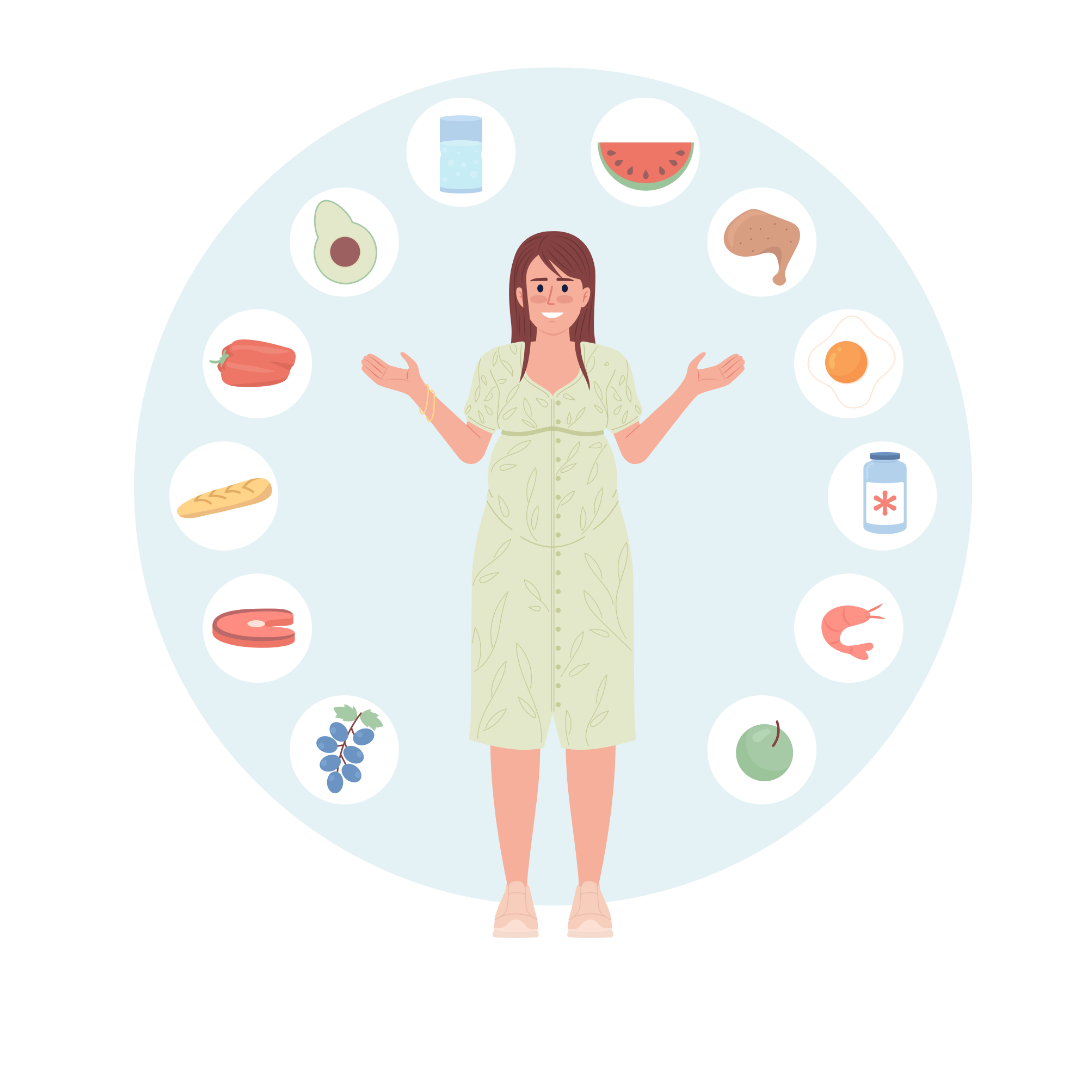Indian Diet Chart For Pregnant Women
An Indian pregnancy diet chart focuses on providing essential nutrients for the mother’s and baby’s health and development. It emphasises a balanced and diverse selection of traditional Indian foods rich in vitamins, minerals, protein, and fibre.
This pregnancy diet chart considers the cultural preferences and availability of ingredients in Indian households. A pregnant food chart outlines recommended nutritional choices for each trimester, supporting the health of both mother and baby. Proper nourishment is essential for pregnant women food, as their dietary choices play a significant role in ensuring a healthy pregnancy and supporting the well-being of the growing foetus.
The Indian pregnancy diet chart also emphasises the importance of staying hydrated and includes specific guidelines for each trimester of pregnancy. It includes a variety of fruits, vegetables, whole grains, pulses, dairy products, and healthy fats. During 1 to 3 months of pregnancy, crucial organ development occurs, making it vital for expectant mothers to consume nutrient-rich foods.
By following this diet chart, pregnant women can support their well-being and contribute to their babies’ optimal growth and development.
Indian foods & beverages to consume for a healthy pregnancy
In Indian cuisine, several traditional foods are rich in essential nutrients and can be incorporated into a healthy pregnancy diet chart. Here are some Indian foods that are particularly beneficial during pregnancy:
Carbohydrate-rich foods
- Whole grains (rice, wheat, oats): These provide essential carbohydrates, fibre, and vitamin B for sustained energy and proper digestion.
- Millets (ragi, jowar, bajra): These gluten-free grains are rich in fibre, iron, and calcium, promoting overall health and supports digestion.
Protein-rich foods
- Lentils and legumes (moong dal, chana dal): These plant-based proteins are packed with essential amino acids, iron, and folate, supporting healthy growth and development.
- Dairy products (milk, yoghurt, paneer): These are excellent sources of protein, calcium, and vitamin D, vital for bone health and muscle growth.
- Nuts and seeds (almonds, walnuts, flaxseeds): These provide healthy fats, protein, and minerals such as magnesium and zinc, contributing to the baby’s brain development.
Healthy fats
- Ghee (clarified butter): Ghee offers healthy fats, vitamins, and antioxidants, aiding brain development and boosting immunity.
- Coconut oil: This oil contains triglycerides, which are easily digestible and provide energy.
- Olive oil: Olive oil is an incredible source of monounsaturated fats and antioxidants, supporting heart health and reducing inflammation.
Nutrient-rich fruits and vegetables
- Spinach: Loaded with iron, folate, and vitamins A and C, spinach helps prevent anaemia and supports foetal growth.
- Broccoli: This vegetable provides calcium, folate, and fibre, promoting healthy bone development and digestion.
- Oranges: Rich in vitamin C and fibre, oranges aid in collagen formation and strengthen the immune system.
- Avocados: Avocados offer healthy fats, vitamins, and minerals, supporting the baby’s brain and tissue development.
- Sweet potatoes: These are packed with beta-carotene, fibre, and vitamin B6, promoting healthy vision and immune function.
Key nutrients for a healthy pregnancy
During pregnancy, it is crucial to prioritize a nutrient-rich diet that supports the health and development of both the mother and the baby. Additionally, being aware of fruits to avoid in pregnancy is important to ensure overall well-being. Here are essential nutrients that play a vital role in a healthy pregnancy:
Macronutrients
- Carbohydrates: Provide energy and should come from whole grains, fruits, vegetables, and legumes.
- Proteins: Aid in the growth and repair of tissues and can be obtained from lean meats, poultry, fish, eggs, dairy products, legumes, nuts, and seeds.
- Fats: Essential for hormone production and foetal development. Healthy fat sources include avocados, nuts, seeds, olive oil, and fatty fish.
Micronutrients
- Folic acid: Important for developing the baby’s neural tube. Found in leafy green vegetables, legumes, fortified cereals, and citrus fruits.
- Iron: Vital for red blood cell production and preventing anaemia. Sources include lean meats, poultry, fish, spinach, beans, and fortified cereals.
- Calcium: Necessary for foetal bone development. Found in dairy products, leafy greens, fortified plant-based milk, and tofu.
- Vitamin D: Supports calcium absorption and aids in bone development. Sunlight, fortified dairy products, eggs, and fatty fish are sources.
- Omega-3 fatty acids: Crucial for brain and eye development. Fatty fish, flaxseeds, chia seeds, and walnuts are good sources.
- Iodine: Essential for thyroid function and foetal brain development. Found in iodised salt, seafood, and dairy products.
- Vitamin C: Helps in iron absorption and supports the immune system. Citrus fruits, strawberries, bell peppers, and broccoli are rich sources.
- Zinc: Important for cell growth and immune function. Sources include lean meats, poultry, fish, dairy products, legumes, and whole grains.
| Day | Breakfast | Lunch | Evening Snack | Dinner |
|---|---|---|---|---|
| Monday | Vegetable poha with almonds | Roti, dal, mixed vegetable curry | Fruit salad with yoghurt | Spinach paneer curry with rice |
| Tuesday | Oats porridge with nuts and seeds | Methi paratha with curd | Coconut water with dry fruits | Palak dal with roti and salad |
| Wednesday | Idli with sambar and coconut chutney | Brown rice with rajma curry | Vegetable soup with roasted chickpeas | Grilled fish with quinoa and vegetables |
| Thursday | Vegetable upma with coconut chutney | Vegetable pulao with raita | Roasted makhana with herbal tea | Baingan bharta with roti |
| Friday | Besan chilla with mint chutney | Moong dal khichdi with cucumber raita | Mixed nuts with dried fruits | Tofu stir-fry with brown rice |
| Saturday | Whole wheat toast with peanut butter | Spinach and paneer paratha with curd | Buttermilk with fruit salad | Dal tadka with jeera rice |
| Sunday | Ragi dosa with coconut chutney | Vegetable biryani with raita | Veggie sticks with hummus | Palak paneer with roti |
Trimester Wise Indian pregnancy diet chart
We have a comprehensive Indian pregnancy diet chart that showcases a month-by-month meal plan. However, please bear in mind that this is just a basic guide. We urge you to seek advice from a doctor or registered dietitian to get personalised dietary recommendations that suit your unique pregnancy requirements.

First trimester
Month 1-3:
- Include foods rich in folic acid, like spinach, lentils, and oranges.
- Consume whole grains like rice and wheat for energy.
- Add dairy products like milk and yoghurt for calcium.
Second trimester
Month 4-6:
- Include protein-rich foods like lentils, paneer, and nuts.
- Consume iron-rich foods like green leafy vegetables, dates, and jaggery.
- Include vitamin C-rich fruits like citrus and berries to aid iron absorption.
Third trimester
Month 7-9:
- Include foods with omega-3 fatty acids like flaxseeds, walnuts, and fish (if non-vegetarian).
- Consume foods high in calcium, like milk, yoghurt, and sesame seeds.
- Include foods rich in vitamin D, like fortified dairy products and sunlight exposure.
Indian food to avoid during pregnancy
Throughout pregnancy, one must exercise caution when consuming certain Indian dishes that can potentially harm the health of both the mother and the baby. Here’s a list of Indian foods that should be avoided during pregnancy:
- Street foods: Be cautious when consuming street foods like chaat, pani puri, or golgappas, as the hygiene and quality of ingredients may vary, increasing the risk of foodborne illnesses.
- Excessive caffeine: Limit your intake of caffeinated beverages like tea, coffee, and certain aerated drinks, as high caffeine consumption may be associated with unwanted complications like low-birth weight.
- Excessive spicy or oily foods: While mild spices and moderate amounts of oil are generally acceptable, excessive consumption of spicy or oily foods may contribute to heartburn, indigestion, or discomfort.
Tips for a healthy pregnancy diet
It is of utmost importance to ensure a nutritious diet throughout pregnancy for the overall health of the expectant mother and the baby. Listed below are some helpful pointers to maintain a healthy pregnancy diet:
- Eat a variety of foods: Consume fruits, green vegetables, whole grains, lean proteins, and dairy products
- Consume adequate calories: Aim to meet your increased energy needs with healthy choices
- Stay hydrated: Consume at least 8-10 glasses of water daily
- Consume healthy fats: Eat Fatty fish (in limited amounts), walnuts, chia seeds, flaxseeds, and avocados
- Limit processed foods and added sugars: Minimise your intake of processed foods, sugary snacks, and beverages
- Practice food safety: Ensure proper food handling and cooking to prevent foodborne illnesses
Frequently asked questions
During the first trimester of pregnancy, focus on consuming a balanced diet that includes whole grains, fruits, vegetables, legumes, dairy products, and lean proteins. Foods with folate, such as leafy greens, lentils, and citrus fruits, are beneficial.
In the second trimester, continue consuming a variety of nutrient-dense foods. Include calcium-rich foods like milk, yoghurt, and cheese to develop the baby’s bones and teeth. Iron-rich foods like lean meats, legumes, and fortified cereals are also important.
During the third trimester, prioritise foods that provide energy and support the baby’s growth. Include foods with omega-3 fatty acids, such as fatty fish (in limited amounts), walnuts, and flaxseeds. Adequate protein intake from poultry, eggs, and tofu is also essential.
A healthy breakfast for pregnant women may include whole-grain cereal with milk and fresh fruits, a vegetable omelette with whole wheat toast, or a smoothie made with yoghurt, spinach, and berries.
To promote a normal delivery, maintain a well-balanced diet that includes whole grains, proteins, fruits, vegetables, and healthy fats. Stay hydrated and engage in regular exercise as advised by your healthcare provider.
Preparing your body for a normal delivery involves staying active, practising prenatal exercises, attending childbirth education classes, and following a balanced diet supporting energy and nutrient needs.
Some fruits that may be beneficial for easier delivery include dates, which are believed to help with cervical ripening and promote natural labour.
The ideal age to have a baby varies for each individual and depends on personal circumstances and readiness for parenthood. It’s essential to consider emotional, physical, and financial preparedness factors.
There are no specific foods that can facilitate the faster opening of the cervix. However, staying well-nourished, hydrated, and following your healthcare provider’s recommendations can support the natural progression of labour.
A very active baby does not necessarily indicate an early delivery. It’s essential to monitor your baby’s movements and consult your physician if you notice any significant changes or concerns.
Flaxseeds and chia seeds are recommended during pregnancy as they provide essential omega-3 fatty acids and fibre.
Fruits like avocados and berries, particularly blueberries, are beneficial for developing the baby’s brain during pregnancy due to their antioxidant and nutrient content.
Top vegetables for a healthy pregnancy include leafy veggies like spinach and kale, cruciferous vegetables like broccoli and cauliflower, and colourful vegetables like carrots and bell peppers.
Fruits high in folic acid include citrus fruits like oranges, grapefruits, strawberries, and papaya.
Aim for around 7-9 hours of sleep per night during pregnancy to support your overall health and well-being.
Taking care of yourself during the first month of pregnancy involves eating a balanced diet, taking prenatal vitamins as your doctor recommends, staying hydrated, exercising regularly, and seeking prenatal care.
Poha (flattened rice) is generally considered good in pregnancy as it is easy to digest and provides energy. However, ensure it is prepared hygienically.
Suji (semolina) is nutritious and can be consumed during pregnancy in moderate amounts. It is a good source of carbohydrates and helps in maintaining energy levels.
Idli, being steamed and made from fermented batter, is considered a healthy choice during pregnancy. It is easily digestible and provides essential nutrients.
Curd (yoghurt) is beneficial during pregnancy as it contains probiotics that aid digestion and supports gut health. Opt for fresh and pasteurised curd to avoid any risks.
Disclaimer
The content provided within this article has been thoroughly verified for accuracy. However, we advise consulting a healthcare professional before utilising any medication or dietary supplements mentioned herein.

